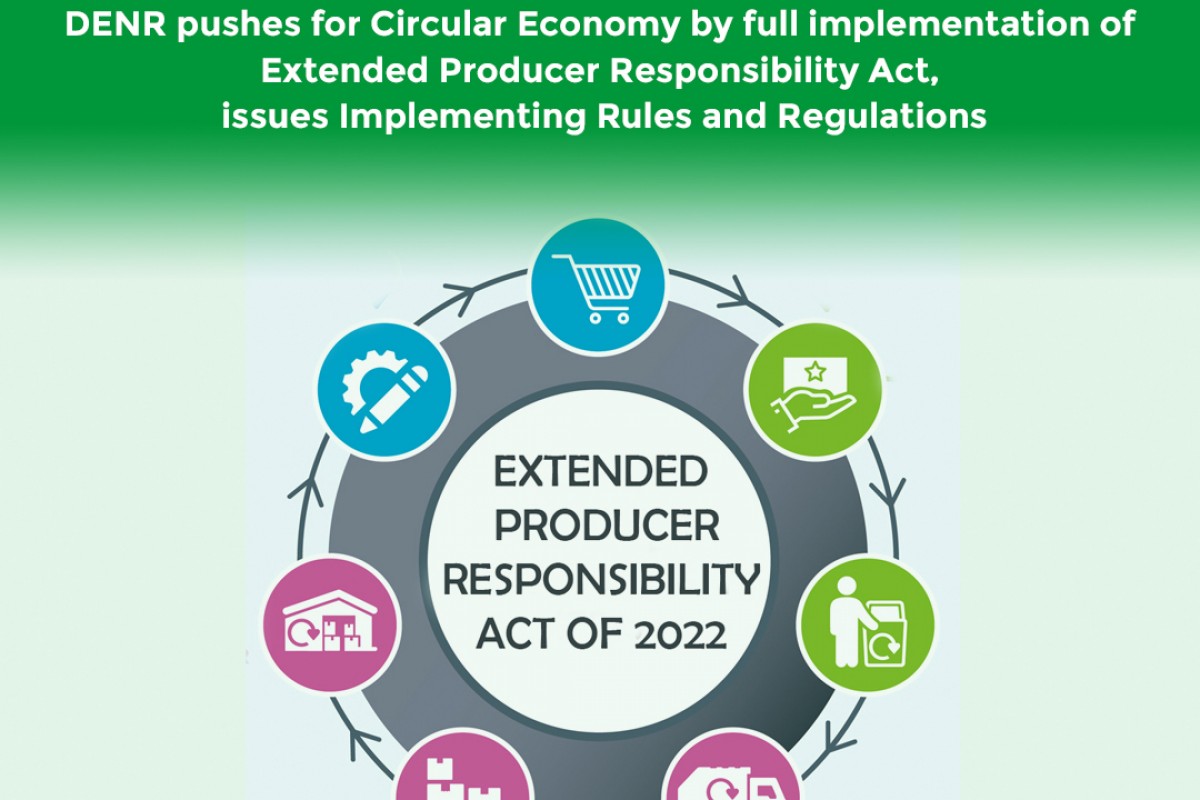QUEZON CITY, (PIA) --The Department of Environment and Natural Resources (DENR) has issued the implementing rules and regulations (IRR) of Republic Act 11898, also known as the Extended Producer Responsibility (EPR) Act of 2022.
The said law requires large-scale companies to establish a mechanism for the recovery of their plastic packaging.
Under the EPR, companies are obliged to have the responsibility for the proper and effective recovery, treatment, recycling or disposal of their products after they have been sold and used by consumers" to reduce the volume of plastic wastes generation and extend the life of plastics by adding value or purpose through upcycling or recycling.
The EPR law will also help in advancing a circular economy that mitigates climate change andprotects our life-supporting ecosystems by avoiding or minimizing pollution while maximizing the use of materials.
Prior to the issuance of the IRR, the DENR led a series of public consultations nationwide to solicit insights and contributions from the different sectors including non-government organizations, academic institutions, local government units, and the private sector.
Among the private sector representatives were sanitary landfill operators, manufacturing corporations, and recycling/upcycling companies.
The series of regional public consultations was capped off in a national dialogue led by the DENR Environmental Management Bureau last November 3, 2022, with over 650 participants across sectors in attendance, with support from the United Nations Development Programme and the Government of Japan.
“The success of the implementation of the EPR law heavily depends on the cooperation and compliance of the private sector. It is always important to recognize the voices of different sectors and the public consultations provided everyone the venue to share and exchange their ideas that contributed to the crafting of the IRR,” said Undersecretary Jonas R. Leones, Undersecretary for Policy, Planning, and International Affairs.
Within six months from the effectivity of the law, these large-scale enterprises are expected to initiate their efforts on plastic recovery and diversion schemes as mandated by the EPR. The IRR also includes an online registry where producers and manufacturers need to register their information.
The implementation of EPR law is a crucial step to the Philippines’ transition to the circular economy. In 2015, the Philippines was cited as the third largest contributor to ocean plastic, with approximately 0.75 million metric tons of plastic ending up in the seas and other waterways annually.
With the EPR law, corporations with total assets of over PhP 100 million will be required to recover a certain percentage of their plastic packaging waste, or else pay a fine. Companies shall be responsible for allocating resources to support the collection, recovery, transportation, processing, recycling, and disposal of plastic packaging wastes in environmentally-sound ways.
Since the passage of this law, the Philippines is now included in a select group of states that promulgate EPR which includes countries such as the United States, Canada, Japan, Singapore, India, South Korea, Chile, Mexico, Columbia, Peru, and Brazil.
The EPR law sets incremental targets that should be fulfilled yearly until 2030. For 2023, obliged companies must recover 20% of their plastic footprint from the year before.
Producers, distributors, and retailers implementing initiatives under the EPR laws will be eligible for tax incentives. However, fines ranging from PhP 5 million to PhP 20 million will be imposed for failure to comply with the provisions and meet the target recovery rates of the EPR.
Meanwhile, those not covered by the law are encouraged to practice voluntarily or be part of a network of obliged enterprises, collectives, or producer responsibility organizations that practice EPR.
The DENR further states that the implementation of this will only succeed with sustained partnership and collaboration among all stakeholders, as well as local government cooperation. (denr/pia-ncr)




